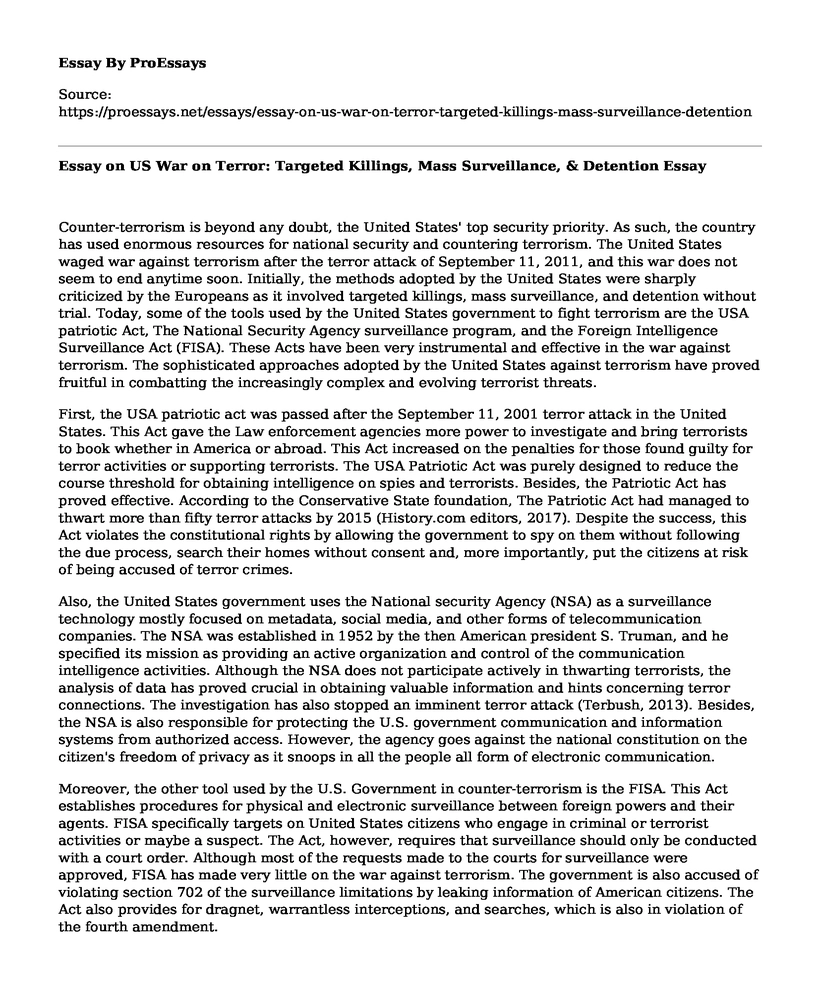Counter-terrorism is beyond any doubt, the United States' top security priority. As such, the country has used enormous resources for national security and countering terrorism. The United States waged war against terrorism after the terror attack of September 11, 2011, and this war does not seem to end anytime soon. Initially, the methods adopted by the United States were sharply criticized by the Europeans as it involved targeted killings, mass surveillance, and detention without trial. Today, some of the tools used by the United States government to fight terrorism are the USA patriotic Act, The National Security Agency surveillance program, and the Foreign Intelligence Surveillance Act (FISA). These Acts have been very instrumental and effective in the war against terrorism. The sophisticated approaches adopted by the United States against terrorism have proved fruitful in combatting the increasingly complex and evolving terrorist threats.
First, the USA patriotic act was passed after the September 11, 2001 terror attack in the United States. This Act gave the Law enforcement agencies more power to investigate and bring terrorists to book whether in America or abroad. This Act increased on the penalties for those found guilty for terror activities or supporting terrorists. The USA Patriotic Act was purely designed to reduce the course threshold for obtaining intelligence on spies and terrorists. Besides, the Patriotic Act has proved effective. According to the Conservative State foundation, The Patriotic Act had managed to thwart more than fifty terror attacks by 2015 (History.com editors, 2017). Despite the success, this Act violates the constitutional rights by allowing the government to spy on them without following the due process, search their homes without consent and, more importantly, put the citizens at risk of being accused of terror crimes.
Also, the United States government uses the National security Agency (NSA) as a surveillance technology mostly focused on metadata, social media, and other forms of telecommunication companies. The NSA was established in 1952 by the then American president S. Truman, and he specified its mission as providing an active organization and control of the communication intelligence activities. Although the NSA does not participate actively in thwarting terrorists, the analysis of data has proved crucial in obtaining valuable information and hints concerning terror connections. The investigation has also stopped an imminent terror attack (Terbush, 2013). Besides, the NSA is also responsible for protecting the U.S. government communication and information systems from authorized access. However, the agency goes against the national constitution on the citizen's freedom of privacy as it snoops in all the people all form of electronic communication.
Moreover, the other tool used by the U.S. Government in counter-terrorism is the FISA. This Act establishes procedures for physical and electronic surveillance between foreign powers and their agents. FISA specifically targets on United States citizens who engage in criminal or terrorist activities or maybe a suspect. The Act, however, requires that surveillance should only be conducted with a court order. Although most of the requests made to the courts for surveillance were approved, FISA has made very little on the war against terrorism. The government is also accused of violating section 702 of the surveillance limitations by leaking information of American citizens. The Act also provides for dragnet, warrantless interceptions, and searches, which is also in violation of the fourth amendment.
Conclusion
In conclusion, the United States government has the most complex structure and tools for counter-terrorism. These tools have proved to be the most effective and accurate. However, the constitutionality of the three tools discussed above, which are NSA, FISA, and the USA patriotic Act, is questionable, and most have been accused of violating human rights, denying the constitutional provisions and illegal snooping.
References
Banks, W. C. (2017). Next Generation Foreign Intelligence Surveillance Law: Renewing 702. U. Rich. L. Rev., 51, 671. https://scholarship.richmond.edu/lawreview/vol51/iss3/4/
Donohue, L. K. (2016). The Future of Foreign Intelligence: Privacy and Surveillance in a Digital Age. Oxford University Press. https://searchworks.stanford.edu/view/11679102
Gellman, B., & Soltani, A. (2014). NSA surveillance program reaches 'into the past' to retrieve, replay phone calls. The Washington Post, 18. https://www.schwartzreport.net/nsa-surveillance-program-reaches-into-the-past-to-retrieve-replay-phone-calls/
Taylor, R. W., Fritsch, E. J., & Liederbach, J. (2014). Digital crime and digital terrorism. Prentice-Hall Press. https://dl.acm.org/doi/book/10.5555/2655330
Cite this page
Essay on US War on Terror: Targeted Killings, Mass Surveillance, & Detention. (2023, Apr 09). Retrieved from https://proessays.net/essays/essay-on-us-war-on-terror-targeted-killings-mass-surveillance-detention
If you are the original author of this essay and no longer wish to have it published on the ProEssays website, please click below to request its removal:
- Essay Sample on Media Violence
- Hursthouse, Conservative View
- The Culture of the Homeless Population Essay
- Exploring Serotonin Syndrome: Antidepressant Drug-Drug Interactions - Essay Sample
- Canada: The Formation of a Sovereign Nation 1867-1949 - Essay Sample
- Essay Example on Bullying: Power Dynamics & Its Impact on Society
- Sentencing Guidelines, Mandatory Minimums & Fair Justice - Essay Example







